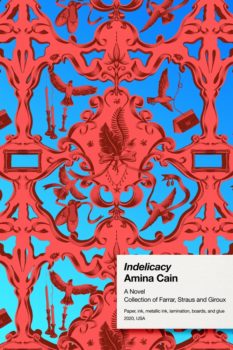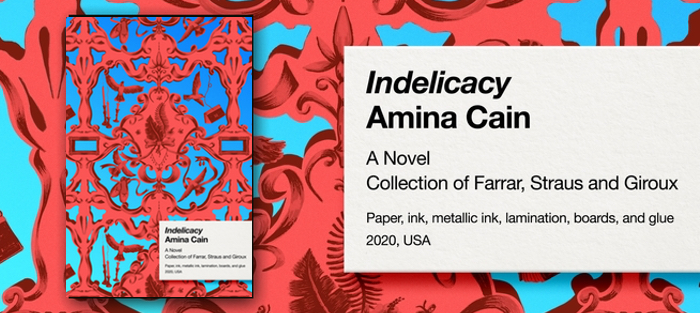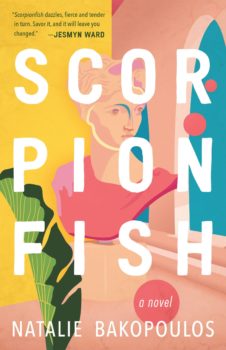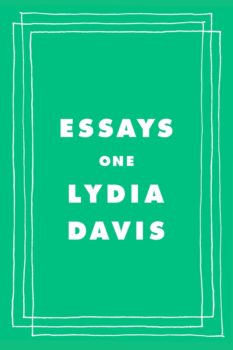In the opening pages of Amina Cain’s novel Indelicacy (Farrar, Straus and Giroux), the narrator, Vitória, newly alone in the countryside notes: “In the afternoons there’s a spaciousness larger than I’ve ever wanted. I had a husband and I left him…Now I have writing, but I also have too much of my own self. I am stalking my own soul.”
Though it may seem so, this is not a statement of regret. At least, not quite. The spaciousness Vitória describes has made room for what is to follow: a novel about art and friendship, and more important, female autonomy. There’s a lot of attention to emptiness in this book—the town she grew up in emptied out in the summer, “making space” for her; empty sidewalks allow for a “fascination inside”; an empty stage is “bright, waiting for the dancers”; and she’s drawn to “paintings with empty spaces in them.” In short, emptiness is less about lack and more about potential. Filling her notebook, she remarks: “I felt I must be filling myself too.” Her earlier life did not allow such opportunity: before taking a job in the city at an art gallery, before the marriage she has now left behind, she’d lived in a crammed house with many siblings. There was hardly room to be, let alone fill—only things and people and demands. The opposite of emptiness here is not fullness, but rather an encroaching, an eclipsing, a closing off of space.
In an interview in the Guardian, Rachel Cusk has noted: “For me, writing and living are the same thing, or they ought to be.” And though Indelicacy does not announce itself as autofiction, it shares with autofiction what I find to be the most fundamental aspects of the genre: the act of writing becomes inextricable from the story being told. Specifically, the act is an assertion, or restoration, of the self—in this instance a feminine artist self.
“I was told by my husband I was writing about my own mind,” Vitória writes. “I was told this wasn’t becoming. But I saw myself in the paintings…I was always returning the subject to myself.”
 Τhe connotations of “becoming” here are multivalent—her husband means it as unsuitable, unseemly, unattractive. Indelicate. The novel, though, is about an uninterrupted emergence and shaping of the self. Yet Indelicacy is not only introverted. The novel turns outward while also, reflexively, remaining its subject.
Τhe connotations of “becoming” here are multivalent—her husband means it as unsuitable, unseemly, unattractive. Indelicate. The novel, though, is about an uninterrupted emergence and shaping of the self. Yet Indelicacy is not only introverted. The novel turns outward while also, reflexively, remaining its subject.
The book does this first through its engagement with art. Before her marriage to a rich man—a jump in station and class that she never quite embraces—Vitória was a cleaner at an art gallery. But Cain is far too sophisticated to simply offer the reader a series of images that drew on the tropes of painting: still life, image, frame. Instead, the paintings help Vitória become a writer: she begins first by writing about them. “I began to feel that I could see my writing—not the worlds of the paintings—somehow in between. That I had made a new thing.” But what’s most compelling of all—both in its artistry and in its significance—is the way Vitória becomes involved in the actual act of framing, in the actual act of composition. “When I was supposed to be cleaning,” Vitória notes, “I would look out the windows of the museum, the paintings behind me reflected in the glass. It meant something to me to see myself with them.” As if this hybrid of the painting, herself, and the reflection is another new thing.
She does the same for her friends, particularly Antoinette, with whom she worked in the gallery, and Dana, a friend from her dance class. “In the parlor, [Antoinette] sat in front of the windows with green trees behind her.” Or: “I saw Antoinette lounging in a tropical place…I saw her sitting in a chair among plants, having her portrait painted. I saw Dana walking in a city with desertlike mountains next to it and then in a lush green field.”
What Cain is doing here is not for the reader’s gaze, but for Vitória’s—she’s both subject and observer, and her compositions—controlling what is both in and out of the frame—are part of her becoming. Imagination, after all, is also reflexive: it springs from itself. Through it she gives birth to her own liberation. She is not simply daydreaming, inserting herself into different landscapes as an escape from the life she has. Rather, Vitória is engaged in an act of autocomposition.
Enjoy yourself. See yourself. Be yourself. It’s no coincidence that these reflexive constructions come up again and again. “Be yourself again” [1] —she writes, or maybe she thinks, as if in marriage she has abandoned something fundamental to who she is. Writing will help her get it back.
But not writing alone, and not without casualties. Vitória has a plan to leave—we know from the book’s first lines that she has done so at the time of the telling—but the plan involves a simple request of her maid, Solange. (Her relationship with Solange is fraught; her own humble class background makes it difficult for her to accept her own new station, and though she tries to befriend Solange at first, this does not go well.) Of course, when a power structure is imbalanced, no request is a simple one; it might not even be a request at all. It sets Vitória free, yes, but also provides a commentary on power, on claiming it, and the less vulnerable people who suffer in its wake—who, in short, invariably clean up the mess.
Near the end of the novel, Vitória notes: “In every painting, someone or something emerges. I emerged here into the country. I emerged walking along these dull streets, close to my own mind and what I know of life. Close to my blind spots, my limitations as a person, the limits of what I can perceive, at least for now.” She suggests—the novel suggests—that as a writer and a woman she is always becoming, that Vitória hasn’t arrived at some final state there in the country but one that is continuing to emerge. The book has ended but the story has not. Vitória will always be bending toward something, walking toward something, framed by windows, both subject and agent of her life’s trajectory.
As the novel’s Clarice Lispector epigraph reads:
It’s as if something that should happen is waiting for me…it’s something that owes itself to me, it looks like me, it’s almost myself. But it never gets close. You can call it fate if you want. Because I’ve tried to go out and meet it.
[1] This line, like many others, echoes Jean Genet’s play The Maids, and the novel has several allusions to it, in both theme and object: a red dress, the name Solange, the way power is claimed.






